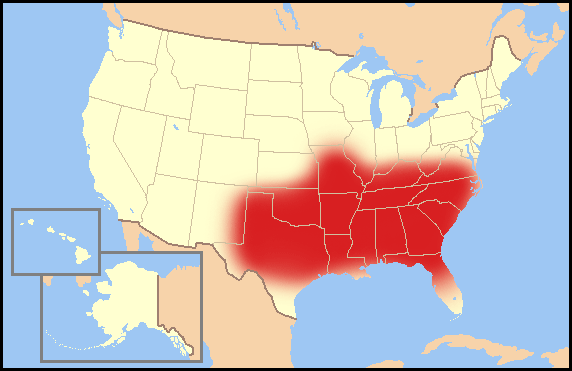I've heard American friends tell me about how the first question they get asked when they meet someone new is "what church do you go to?"
Not in California! I assume that question is asked in our "Bible belt".
Welcome to Religious Forums, a friendly forum to discuss all religions in a friendly surrounding.
Your voice is missing! You will need to register to get access to the following site features:We hope to see you as a part of our community soon!
I've heard American friends tell me about how the first question they get asked when they meet someone new is "what church do you go to?"
Is St. Louis the Bible Belt?Not in California! I assume that question is asked in our "Bible belt".
Religion is not as important as spirituality anymore, it seems.
I've heard American friends tell me about how the first question they get asked when they meet someone new is "what church do you go to?"
That's never happened to me.
Is St. Louis the Bible Belt?

Religiosity in Canada is at an all-time low, with recently released data from Statistics Canada showing only 68 per cent of Canadians 15 or older now report having a religious affiliation. It’s the first time that number has dipped below 70 per cent since StatCan began tracking the data in 1985.
It's important to note that this decline is not across the board; the number of Muslims, Sikhs, Buddhists and Hindus is increasing, and StatCan predicts the number of Canadians reporting a non-Christian religious affiliation could double by the year 2036.
Christianity, however, is in sharp decline. In 2011, 67.3 per cent (about 22.1 million people) of Canadians said they were affiliated with a Christian religion. In 2019, that number had dropped to 63.2 per cent. Catholicism, Canada’s largest denomination, now accounts for 32 per cent of Canadians over 15, down from 46.9 per cent in 1996.
THe United Church of Canada, the country’s second-largest Canadian Christian denomination, accounted for 14.6 per cent of Canadians in 1985. In 1996, that number had declined to 9.7 per cent and to just 3.8 per cent in 2019. Islam, considered a minority religion, now sits at 3.7 per cent.
Will Christianity be pretty much gone in Canada in 20 years or so? Looks possible.
......."no civilization could long survive the loss of the best in its religion"

If marriage is good for heterosexuals and society then it's good for gay people. Marriage is a positive social value. But marriage is not a department of the church.I remember when we gays could finally start getting legally married and conservatives freaked out about how society was going to collapse then too.
It's would be nice. I won't miss those obnoxious religious radio shows begging for money and peddling their wares.Religiosity in Canada is at an all-time low, with recently released data from Statistics Canada showing only 68 per cent of Canadians 15 or older now report having a religious affiliation. It’s the first time that number has dipped below 70 per cent since StatCan began tracking the data in 1985.
It's important to note that this decline is not across the board; the number of Muslims, Sikhs, Buddhists and Hindus is increasing, and StatCan predicts the number of Canadians reporting a non-Christian religious affiliation could double by the year 2036.
Christianity, however, is in sharp decline. In 2011, 67.3 per cent (about 22.1 million people) of Canadians said they were affiliated with a Christian religion. In 2019, that number had dropped to 63.2 per cent. Catholicism, Canada’s largest denomination, now accounts for 32 per cent of Canadians over 15, down from 46.9 per cent in 1996.
THe United Church of Canada, the country’s second-largest Canadian Christian denomination, accounted for 14.6 per cent of Canadians in 1985. In 1996, that number had declined to 9.7 per cent and to just 3.8 per cent in 2019. Islam, considered a minority religion, now sits at 3.7 per cent.
Will Christianity be pretty much gone in Canada in 20 years or so? Looks possible.
I asked what I thought was about a million people, "Okay, so you think if two guys can get married, marriage will lose its value and everybody will hate it -- so, will you stop loving your wife (or husband) if I marry my partner?"I remember when we gays could finally start getting legally married and conservatives freaked out about how society was going to collapse then too.
I remember when we gays could finally start getting legally married and conservatives freaked out about how society was going to collapse then too.
If marriage is good for heterosexuals and society then it's good for gay people. Marriage is a positive social value. But marriage is not a department of the church.
Is St. Louis the Bible Belt?
I understood you, extending the marriage institution to include gay people isn’t the decline in values “conservative” religious people feared.You appear to have completely missed the point.
I understood you, extending the marriage institution to include gay people isn’t the decline in values “conservative” religious people feared.
If we can survive its worse........"no civilization could long survive the loss of the best in its religion"
Indiana has a problem with that.Not in California! I assume that question is asked in our "Bible belt".
Oh the drama! I said that the conservatives feared gay marriage but they were wrong.No, it literally was. I'm gay. I was there.
